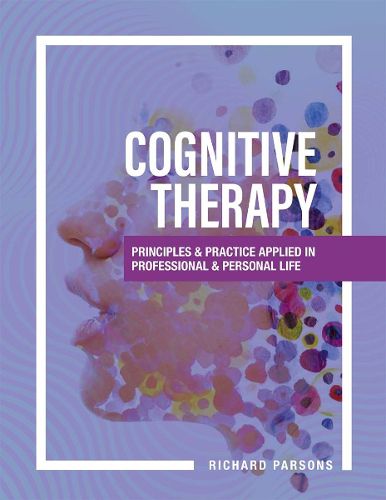Readings Newsletter
Become a Readings Member to make your shopping experience even easier.
Sign in or sign up for free!
You’re not far away from qualifying for FREE standard shipping within Australia
You’ve qualified for FREE standard shipping within Australia
The cart is loading…






This title is printed to order. This book may have been self-published. If so, we cannot guarantee the quality of the content. In the main most books will have gone through the editing process however some may not. We therefore suggest that you be aware of this before ordering this book. If in doubt check either the author or publisher’s details as we are unable to accept any returns unless they are faulty. Please contact us if you have any questions.
Cognitive Therapy: Principles and Practice Applied in Professional and Personal Life is designed to help practicing clinicians employ cognitive therapy both with their clients and within their own lives to build self-awareness and foster happiness and emotional wellbeing. By taking ownership of the cognitive therapy model, the text posits that clinicians can better assist their patients in the treatment of severe emotional disturbances.
The book is divided into two sections. In Section I, readers learn the core concepts of cognitive therapy and strategies to help them explain the cognitive paradigm to clients. Subsequent chapters address the power and functionality of human emotion, the difficulty of changing irrational beliefs, and the need to recognize and reshape different types of distorted thinking. In Section II, practitioners learn how to help clients experiencing cognitive distortions due to stress, anxiety, shame, guilt, the need for approval, anger, and depression. Each chapter includes clear and effective Directives for Practitioners, exercises to encourage self-reflection and personal application, key takeaways, and a list of additional resources.
Approachable, personal, and highly applicable, Cognitive Therapy is an ideal text for courses on cognitive therapy and any clinician who wants to help clients better understand the innate power they hold over their own emotional wellbeing.
$9.00 standard shipping within Australia
FREE standard shipping within Australia for orders over $100.00
Express & International shipping calculated at checkout
This title is printed to order. This book may have been self-published. If so, we cannot guarantee the quality of the content. In the main most books will have gone through the editing process however some may not. We therefore suggest that you be aware of this before ordering this book. If in doubt check either the author or publisher’s details as we are unable to accept any returns unless they are faulty. Please contact us if you have any questions.
Cognitive Therapy: Principles and Practice Applied in Professional and Personal Life is designed to help practicing clinicians employ cognitive therapy both with their clients and within their own lives to build self-awareness and foster happiness and emotional wellbeing. By taking ownership of the cognitive therapy model, the text posits that clinicians can better assist their patients in the treatment of severe emotional disturbances.
The book is divided into two sections. In Section I, readers learn the core concepts of cognitive therapy and strategies to help them explain the cognitive paradigm to clients. Subsequent chapters address the power and functionality of human emotion, the difficulty of changing irrational beliefs, and the need to recognize and reshape different types of distorted thinking. In Section II, practitioners learn how to help clients experiencing cognitive distortions due to stress, anxiety, shame, guilt, the need for approval, anger, and depression. Each chapter includes clear and effective Directives for Practitioners, exercises to encourage self-reflection and personal application, key takeaways, and a list of additional resources.
Approachable, personal, and highly applicable, Cognitive Therapy is an ideal text for courses on cognitive therapy and any clinician who wants to help clients better understand the innate power they hold over their own emotional wellbeing.